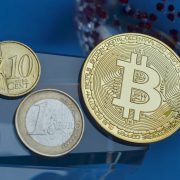The situation in Venezuela saw a country suffering from hyperinflation turn to cryptocurrencies as a more stable means to transact and in which to store value.
Venezuelan President Nicolás Maduro announced in August of this year his plans to stabilize the economy through a variety of economic incentives formulated to help the country recover. One of these economic measures involved the devaluation of the country’s currency, the bolívar, by 95% by pegging the currency to a state-backed cryptocurrency, the Petro.
Suspicions regarding the new bolívar and the Petro have increased in light of the fact that the state-owned oil company is unable to settle its debt and the pseudo-backing by oil reserves is evidently meaningless in that the Petro market cap of $5.9 billion is a significant amount less than the oil company’s reported debt of $45 billion. Although the economic actions of President Maduro are heavily criticized by the international community for being “a scam on top of another scam”, many Venezuelans are still struggling under this failed economic model.
Dash as the Cryptocurrency of Choice?
In August 2018, Business Insider reported that the cryptocurrency most Venezuelans were turning to in order to combat Venezuela’s wild inflation was not bitcoin or the Petro but rather Dash. Dash, the non-state-backed cryptocurrency, was reported to be making huge inroads in the country.
Dash CEO, Ryan Taylor, stated that there were “tens of thousands of wallet downloads from the country each month” and that “Venezuela became our No. 2 market, even ahead of China and Russia, which are, of course, huge into cryptocurrency right now”. According to the Dash Core Group, the rate of adoption of Dash was accelerating, with 200 merchants per month signing up to accept the cryptocurrency. Some such merchants include famous brands such as Subway and Calvin Klein.
Gómez Denied Use of Snake Oil for Payments
Eduardo Gómez, head of support at Purse.io, has become known for his opinions regarding Venezuela’s cryptocurrency markets. Although well-known for his knowledge of bitcoin habits, Gómez was also noted to reject allegations that Dash, one of the alternative cryptocurrencies in Venezuela, was becoming a go-to currency replacement similar to that of bitcoin (BTC) anywhere in South America.
Despite allegations in the media that Dash is increasing in popularity and growing in local adoption, Gómez openly rejected these notions. When asked about his thoughts on Dash, Gómez responded by branding Dash as “snake oil” and continued to state that “nobody uses it for payments down here [in South America]”.
Bitcoin’s Increase in Trading Volumes
Gómez also recently commented on the figures from Localbitcoins, the P2P trading platform, which were gathered by Coin Dance, the monitoring site, stating that the movement in bitcoin in the market over the past fortnight was enormous. These figures show a total of 898 BTC changing hands for the week ending on 22 September 2018, and a total of 877 BTC changing hands for the week ending on 29 September 2018.
This spike in trading volumes marked the largest ever seven-day trading volumes for bitcoin by Venezuelans, coming one month after the currency reforms of the country took effect. These trading volumes outpaced the notorious spike in April of this year, which was 805 BTC, 93 BTC less than the September volumes. According to Gómez, this transfer of bitcoin in the market, unlike that of Dash, is “huge”.
Do you believe reports that Dash is the most popular cryptocurrency in Venezuela? Or is Gómez right in his assertions that Dash isn’t used as a currency replacement? Give us your thoughts in the comments below.
Follow CoinBeat on Facebook, Twitter & Telegram
Subscribe to our CoinBeat Newsletter
Submit an article to CoinBeat
View live Marketcap Prices here







Comments